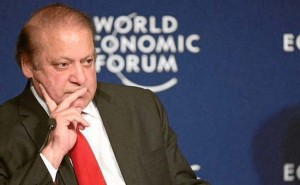DAVOS: Even as India and Pakistan struggle to keep bilateral ties on course after the Pathankot terror attacks, Pakistan’s Prime Minister Nawaz Sharif has struck an optimistic note about huge potential for enhancing trade between the two countries.
“With India once we are able to normalise the relations and restore the composite dialogue, there is huge potential for bilateral cooperation on trade and other areas,” Mr Sharif said at the Swiss ski resort Davos at the World Economic Forum meeting on January 21.
The Pathankot attacks, blamed on Pakistan-based terror outfit Jaish e-Mohammad, has stressed the resumption of dialogue between the two countries. But the two countries have shown more maturity and instead of resorting to strident mutual accusations, India and Pakistan have agreed to reschedule the foreign secretary level talks in the “near future”. Speaking about transforming South Asia, Mr Sharif focused on various industrial projects being set up in Pakistan and in the region. He was addressing a gathering at a session on transforming South Asia. “TAPI is a gas pipeline which is now being laid from Turkmenistan to India, that will also meet a significant requirement of gas in Pakistan,” Mr Sharif said.
India-Pakistan trade
The trade between India, Pakistan fell from $2.7 billion in 2013-14 to $2.3 billion in 2014-15. Exports to Pakistan declined while imports from Pakistan increased. The exports declined by 18.34 percent during 2014-15 compared to 2013-14, while the imports increased on the other hand by 16.5 percent. In 2012, Pakistan shifted to a system of negative list of 1209 items that are not to be imported from India. However, among these items, only 137 items are allowed by Pakistan that can be imported through the Wagah-Attari border.
Pakistan has also not been able to grant Most Favoured Nation (MFN) status to India. MFN status would enable direct imports into Pakistan from India. This would be more economical instead of indirect routes that translate into higher transport costs.
Speaking about inequality, Mr Sharif said, “I am very happy that India is doing the right thing by creating banks for the poor people. The boost to micro credit institutions is the right thing to do, otherwise all the investments etc will not save us.”
“There are various other projects that will help the countries in the region including the domestic market. Both Pakistan and Afghanistan are trying to establish peace in Afghanistan,” Mr Sharif said.
Speaking about his outlook for the next one year on economic front, Mr Sharif said, “We will come to know when we cross the bridge”. He also spoke about how the government has a lot of money due to oil price decline and how it had benefited hugely from the low prices in terms of decline in the electricity prices and other factors. “We have passed on the benefits to the people of the country.”
Author Profile
- India Writes Network (www.indiawrites.org) is an emerging think tank and a media-publishing company focused on international affairs & the India Story. Centre for Global India Insights is the research arm of India Writes Network. To subscribe to India and the World, write to editor@indiawrites.org. A venture of TGII Media Private Limited, a leading media, publishing and consultancy company, IWN has carved a niche for balanced and exhaustive reporting and analysis of international affairs. Eminent personalities, politicians, diplomats, authors, strategy gurus and news-makers have contributed to India Writes Network, as also “India and the World,” a magazine focused on global affairs.
Latest entries
 DiplomacyJanuary 5, 2026India walks diplomatic tightrope over US operation in Venezuela
DiplomacyJanuary 5, 2026India walks diplomatic tightrope over US operation in Venezuela India and the WorldNovember 26, 2025G20@20: Africa’s Moment – The Once and Future World Order
India and the WorldNovember 26, 2025G20@20: Africa’s Moment – The Once and Future World Order DiplomacyOctober 4, 2025UNGA Resolution 2758 Must Not Be Distorted, One-China Principle Brooks No Challenge
DiplomacyOctober 4, 2025UNGA Resolution 2758 Must Not Be Distorted, One-China Principle Brooks No Challenge India and the WorldJuly 26, 2025MPs, diplomats laud Operation Sindoor, call for national unity to combat Pakistan-sponsored terror
India and the WorldJuly 26, 2025MPs, diplomats laud Operation Sindoor, call for national unity to combat Pakistan-sponsored terror








